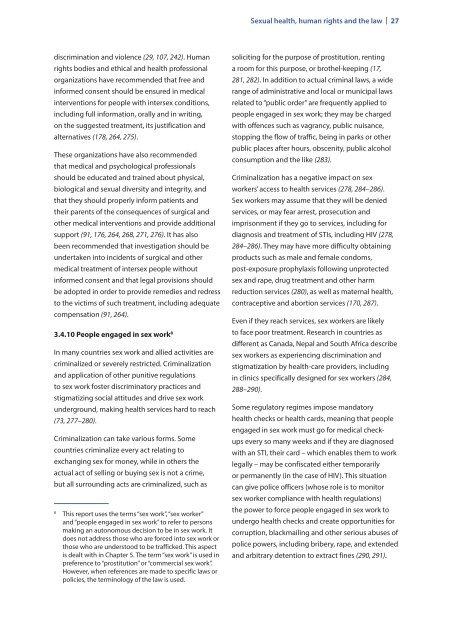Sexual health human rights and the law
1XoaDvM
1XoaDvM
You also want an ePaper? Increase the reach of your titles
YUMPU automatically turns print PDFs into web optimized ePapers that Google loves.
<strong>Sexual</strong> <strong>health</strong>, <strong>human</strong> <strong>rights</strong> <strong>and</strong> <strong>the</strong> <strong>law</strong> | 27<br />
discrimination <strong>and</strong> violence (29, 107, 242). Human<br />
<strong>rights</strong> bodies <strong>and</strong> ethical <strong>and</strong> <strong>health</strong> professional<br />
organizations have recommended that free <strong>and</strong><br />
informed consent should be ensured in medical<br />
interventions for people with intersex conditions,<br />
including full information, orally <strong>and</strong> in writing,<br />
on <strong>the</strong> suggested treatment, its justification <strong>and</strong><br />
alternatives (178, 264, 275).<br />
These organizations have also recommended<br />
that medical <strong>and</strong> psychological professionals<br />
should be educated <strong>and</strong> trained about physical,<br />
biological <strong>and</strong> sexual diversity <strong>and</strong> integrity, <strong>and</strong><br />
that <strong>the</strong>y should properly inform patients <strong>and</strong><br />
<strong>the</strong>ir parents of <strong>the</strong> consequences of surgical <strong>and</strong><br />
o<strong>the</strong>r medical interventions <strong>and</strong> provide additional<br />
support (91, 176, 264, 268, 271, 276). It has also<br />
been recommended that investigation should be<br />
undertaken into incidents of surgical <strong>and</strong> o<strong>the</strong>r<br />
medical treatment of intersex people without<br />
informed consent <strong>and</strong> that legal provisions should<br />
be adopted in order to provide remedies <strong>and</strong> redress<br />
to <strong>the</strong> victims of such treatment, including adequate<br />
compensation (91, 264).<br />
3.4.10 People engaged in sex work 8<br />
In many countries sex work <strong>and</strong> allied activities are<br />
criminalized or severely restricted. Criminalization<br />
<strong>and</strong> application of o<strong>the</strong>r punitive regulations<br />
to sex work foster discriminatory practices <strong>and</strong><br />
stigmatizing social attitudes <strong>and</strong> drive sex work<br />
underground, making <strong>health</strong> services hard to reach<br />
(73, 277–280).<br />
Criminalization can take various forms. Some<br />
countries criminalize every act relating to<br />
exchanging sex for money, while in o<strong>the</strong>rs <strong>the</strong><br />
actual act of selling or buying sex is not a crime,<br />
but all surrounding acts are criminalized, such as<br />
8<br />
This report uses <strong>the</strong> terms “sex work”, “sex worker”<br />
<strong>and</strong> “people engaged in sex work” to refer to persons<br />
making an autonomous decision to be in sex work. It<br />
does not address those who are forced into sex work or<br />
those who are understood to be trafficked. This aspect<br />
is dealt with in Chapter 5. The term “sex work” is used in<br />
preference to “prostitution” or “commercial sex work”.<br />
However, when references are made to specific <strong>law</strong>s or<br />
policies, <strong>the</strong> terminology of <strong>the</strong> <strong>law</strong> is used.<br />
soliciting for <strong>the</strong> purpose of prostitution, renting<br />
a room for this purpose, or bro<strong>the</strong>l-keeping (17,<br />
281, 282). In addition to actual criminal <strong>law</strong>s, a wide<br />
range of administrative <strong>and</strong> local or municipal <strong>law</strong>s<br />
related to “public order” are frequently applied to<br />
people engaged in sex work; <strong>the</strong>y may be charged<br />
with offences such as vagrancy, public nuisance,<br />
stopping <strong>the</strong> flow of traffic, being in parks or o<strong>the</strong>r<br />
public places after hours, obscenity, public alcohol<br />
consumption <strong>and</strong> <strong>the</strong> like (283).<br />
Criminalization has a negative impact on sex<br />
workers’ access to <strong>health</strong> services (278, 284–286).<br />
Sex workers may assume that <strong>the</strong>y will be denied<br />
services, or may fear arrest, prosecution <strong>and</strong><br />
imprisonment if <strong>the</strong>y go to services, including for<br />
diagnosis <strong>and</strong> treatment of STIs, including HIV (278,<br />
284–286). They may have more difficulty obtaining<br />
products such as male <strong>and</strong> female condoms,<br />
post-exposure prophylaxis following unprotected<br />
sex <strong>and</strong> rape, drug treatment <strong>and</strong> o<strong>the</strong>r harm<br />
reduction services (280), as well as maternal <strong>health</strong>,<br />
contraceptive <strong>and</strong> abortion services (170, 287).<br />
Even if <strong>the</strong>y reach services, sex workers are likely<br />
to face poor treatment. Research in countries as<br />
different as Canada, Nepal <strong>and</strong> South Africa describe<br />
sex workers as experiencing discrimination <strong>and</strong><br />
stigmatization by <strong>health</strong>-care providers, including<br />
in clinics specifically designed for sex workers (284,<br />
288–290).<br />
Some regulatory regimes impose m<strong>and</strong>atory<br />
<strong>health</strong> checks or <strong>health</strong> cards, meaning that people<br />
engaged in sex work must go for medical checkups<br />
every so many weeks <strong>and</strong> if <strong>the</strong>y are diagnosed<br />
with an STI, <strong>the</strong>ir card – which enables <strong>the</strong>m to work<br />
legally – may be confiscated ei<strong>the</strong>r temporarily<br />
or permanently (in <strong>the</strong> case of HIV). This situation<br />
can give police officers (whose role is to monitor<br />
sex worker compliance with <strong>health</strong> regulations)<br />
<strong>the</strong> power to force people engaged in sex work to<br />
undergo <strong>health</strong> checks <strong>and</strong> create opportunities for<br />
corruption, blackmailing <strong>and</strong> o<strong>the</strong>r serious abuses of<br />
police powers, including bribery, rape, <strong>and</strong> extended<br />
<strong>and</strong> arbitrary detention to extract fines (290, 291).


